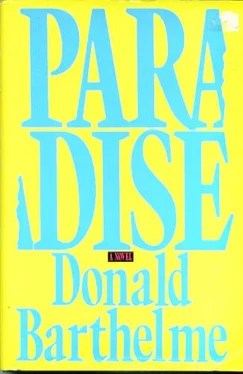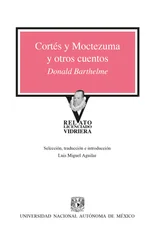“What fool bought brisket?”
“A friend.”
His mother understands what this means. “You’ve got to boil the hell out of it,” she says. “How many pounds?”
“Four.”
“I’d give it three and a half to four hours in stock with carrots. Never did see the point of carrots but they must be good for something. Slice an onion and put in some red wine. What’s your friend’s name?”
“They’re just some people who’re staying here temporarily.”
“How’s Sarah?”
“Doing well. She got a General Electric fellowship. Four thousand bucks.”
“Every little bit helps,” his mother says. “You and Carol speaking to each other?”
“At intervals. She’s very busy.”
“Does she have a friend?”
“Probably. I don’t know.”
“Make a sauce for it with capers, horseradish, mayonnaise and some of the cooking stock. Chill the sauce, it’s best cold. That’s all I know about brisket. You could stick some red cabbage into the pot for the last thirty minutes of cooking. Also, if I were you I’d buy some Union Carbide.”
“Why?”
“Do what your mother tells you,” she says, and hangs up.
His mother likes to present herself as a tough old bird, and in fact, that’s the way he thinks of her. But there is a lustrous photograph of his mother sitting by the side of a pool in the 30s, radiating a formidable sexuality. Then no tough old bird but rather a bad, bad article, ready for Clark Gable and Lord Mountbatten, too.
New architecture is “soulless,” Simon reads, again and again and again. He has trouble disagreeing when what is being talked about is a seventy-story curtain-wall building on Sixth Avenue. People don’t like to live or work above the second floor in any building, the third at the outer extreme. No building should be taller than a ship. People like light; on the other hand, they also like caves. An austere façade pleases architects; people like decoration, a modicum of drama. Embassies are now being designed like banks, with more and more security as one moves deeper and deeper into the building, the most secure space, deep inside, mighty like a vault. Reconcile that with the idea of an embassy as a pleasing, friendly presence. Metal detectors set up at the entrances of schools. Gun-toting Wackenhuts in supermarkets (part of the design). Enter a jewelry store and above the selling floor there’s a booth with bulletproof glass with gun ports and a guy with a shotgun. Giant concrete flowerpots all around the Capitol which have nothing to do with love of flowers. The messianic-maniacal idea that architecture will make people better, civilize them, central to much 1920s-1930s architectural thought, Corbusier, Gropius, even Wright, abandoned. Although modesty is not what architects do best, there is more restraint now, Simon thinks. I’ll do my piece of the problem and you do yours. Not at all soulless, rather more cottage industry, S.O.M. notwithstanding. The image that seems to him really on the mark is the circus.
“Man’s chief end is to glorify God and to enjoy Him forever,” says his radio. He’s been listening to a lot of Christian rock lately, finds it surprisingly robust. Jesus is rock in a weary land. He wonders how, say, Dodo Marmarosa would sound playing Christian rock. Dore comes in and shoves a breast in his ear. He makes a sound like a smoke alarm.
He has something cut off his forehead, a skin cancer that’s been there for years, a dark spot the diameter of a pencil eraser. The doctor is a tall gloomy man with a Southern accent. He doesn’t waste time, has Simon on the table and is scraping away with a curette within two minutes. First, four sharp stings as he places the lidocaine; afterward, the smell of burning brain as he cauterizes the blood vessels.
Simon writes a check for eighty-five dollars. He walks back to the apartment from the doctor’s office, something like sixty-five blocks. It’s cool and cloudy out. Bumptious loudmouthed swaggering teenagers coming down the street, jostling people. Simon sidesteps them. Can’t shoot ‘em all. An absolutely beautiful woman in blue walking toward him. He turns and looks after her. She walks on without turning. Well, why should she? He’s fifty-three.
When Simon wonders what kind of animal he is, he identifies with the giraffe. An improbable design, a weird ensemble overall, no special reputation for wisdom, an uncle-figure at best. Neglected by the auto industry: no Ford Giraffes on the highways. Simon too has a long neck, often commented upon, and a peculiar gait, sort of a shamble.
He gets a call from his wife, Carol, in Philadelphia.
“You haven’t paid the car insurance,” she says. “On either car. I got stopped by a cop yesterday and he jacked me up about the insurance.”
“What’d you get stopped for?”
“Taillight.”
“Call Bud at the office and tell him to take care of it,” Simon says. “He’s got all the paperwork on the insurance. How are you?”
“Considering what our mayor is up to, I’m reasonably sane. This thing is really working out much better than I thought it would. Your being gone, I mean.”
“The absence of a plan is itself a plan,” Simon says. “Heard from Sarah?”
“She called a day or so ago. She’s dropped German and history.”
“Oh Lord. Why history?”
“They had to write papers.”
“She can hardly avoid writing papers.”
“She needs a typewriter.”
“Buy her a typewriter.”
“Simon, I’ve got other things to do. I’ll give her a check but I can’t futz around shopping for typewriters.”
“Okay, fine. Is she happy?”
“She’s been going out with some kind of Finn. I think he’s a Finn. Very goodlooking. He’s in the business school.”
“How’s his English?”
“Very Brit. What are you doing?”
“Reading. Walking around.”
“Chasing tail.”
“No I’m not chasing anything.”
“It was just a sociological observation. I don’t care.”
“I know that.”
“Keep in touch.”
“I will.”
“Your bad brother,” Simon says to Dore. “Why is he in New York?”
“Nothing for him in Denver, he thinks. He’s thirty-three. Two years in jail for auto theft. He’s on probation now. He deals when he can get enough money to buy something to deal. He’s good at calculating how often he can hit people up. He has me down for a couple of hundred every three months or so. His name is Burt.”
She holds out an empty wineglass. Simon pouring.
“He’s an engineer, actually. He designed this electric car, where you didn’t have an array of batteries that had to be charged every two or three days. It had a circuit that allowed the batteries to recharge themselves just like gas engines recharge their batteries. There was a tiny computer in there somewhere. That was the car he stole. He was in partnership with these guys who’d put up the development money and when the prototype worked, they cut him out of the company. So he repossessed the car one night but they had the cops waiting for him.”
“Couldn’t he have started up again after he got out?”
“He forgot how he did it. He’d hurt his brain, drinking busthead in jail. He tried, drove himself crazy trying. He’s still trying.”
“Bad luck.”
“Yeah. It could do ninety on the highway, too. My family is not exactly a blue-chip outfit.”
She takes his glass out of his hand. “You drink too much.”
“Goddamnit woman, leave my glass alone.”
“I’d hate to see your liver.”
“Most unlikely that you ever will.”
“And I don’t like it that when we have roast lamb you take all the crackling for yourself.”
“Anything else?”
“Yes. This place isn’t clean.”
Читать дальше












